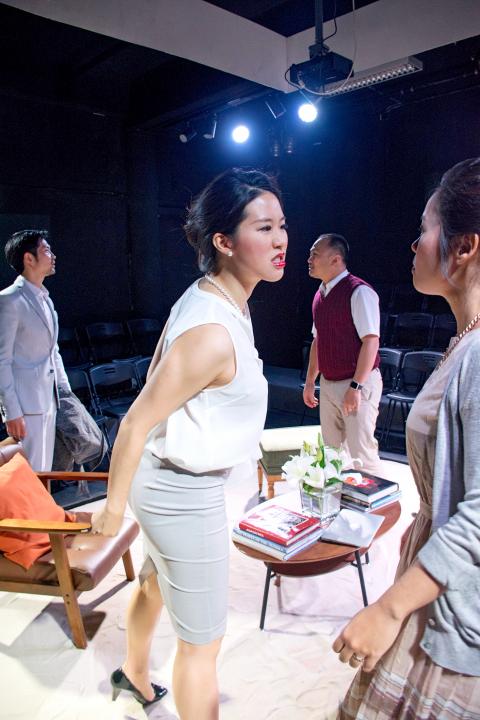If there’s one show that you don’t want to miss this summer, it’s LAB Space’s presentation of Yasmina Reza’s God of Carnage, playing over the next two weekends.
In Carnage, which won the Tony Award for best play in 2009, director Jaime Zuniga has put together a strong, talented cast to meet the demands of a play where there are no small parts and no heroes. Two sets of parents, who meet to resolve a fight between their sons, quickly expose their own dysfunctional marriages in a loser-take-all match where all are basically on stage for a full 90 minutes.
Yong Hui-shurn (楊慧珊) plays Veronica, a writer determined to preserve civilization, its values and symbolic books. She drives the play by arranging the meeting. Derek Kwan (關顯揚) plays Michael, her husband, and a “Neanderthal-type” blue collar.

Photo courtesy of Cheng Yi Lee
On the opposing team is Alan, a busy lawyer played by Lawrence Ong (翁書強). He wants the mundane incident to be settled in 15 minutes so he can get back to his more important clients and work. Lesley Hu (胡世恩) plays Annette, his demure wife. Despite her initial reserved poise, she wreaks carnage by the play’s end.
The lines come fast and furious, and the play dissects not just marriage, but children, families and the point of existence. Each actor and actress has their moment of revelation and vulnerability as all four alternately contest in couple vs couple and gender vs gender battles where the veneer of civilization crumbles and even the symbolic books take a beating.
Making use of LAB Space’s flexible space, Zuniga skillfully stages this one-set play as a close, intimate theatre in the round where any seat is good as the four combatants move about as boxers in a ring. With four-letter words flying in criticism and retaliation, this is not a show for children.
We are “lumps of clay,” Michael jokes at the beginning, but what these four adult enfants terribles fashion by the play’s end is not the most promising. You will laugh, but also be forced to reflect.
■ The LAB Space (實演場), 3F, 9, Beitou Rd Sec 1, Taipei City (台北市北投路一段9號3樓). Remaining shows are tomorrow and Sunday and July 1-3. All shows begin at 8pm, doors open 7:30pm. Tickets are available from NT$600 at: www.accupass.com/go/carnage; for more information, check: thelabtw.com.

That US assistance was a model for Taiwan’s spectacular development success was early recognized by policymakers and analysts. In a report to the US Congress for the fiscal year 1962, former President John F. Kennedy noted Taiwan’s “rapid economic growth,” was “producing a substantial net gain in living.” Kennedy had a stake in Taiwan’s achievements and the US’ official development assistance (ODA) in general: In September 1961, his entreaty to make the 1960s a “decade of development,” and an accompanying proposal for dedicated legislation to this end, had been formalized by congressional passage of the Foreign Assistance Act. Two

Despite the intense sunshine, we were hardly breaking a sweat as we cruised along the flat, dedicated bike lane, well protected from the heat by a canopy of trees. The electric assist on the bikes likely made a difference, too. Far removed from the bustle and noise of the Taichung traffic, we admired the serene rural scenery, making our way over rivers, alongside rice paddies and through pear orchards. Our route for the day covered two bike paths that connect in Fengyuan District (豐原) and are best done together. The Hou-Feng Bike Path (后豐鐵馬道) runs southward from Houli District (后里) while the

March 31 to April 6 On May 13, 1950, National Taiwan University Hospital otolaryngologist Su You-peng (蘇友鵬) was summoned to the director’s office. He thought someone had complained about him practicing the violin at night, but when he entered the room, he knew something was terribly wrong. He saw several burly men who appeared to be government secret agents, and three other resident doctors: internist Hsu Chiang (許強), dermatologist Hu Pao-chen (胡寶珍) and ophthalmologist Hu Hsin-lin (胡鑫麟). They were handcuffed, herded onto two jeeps and taken to the Secrecy Bureau (保密局) for questioning. Su was still in his doctor’s robes at

Mirror mirror on the wall, what’s the fairest Disney live-action remake of them all? Wait, mirror. Hold on a second. Maybe choosing from the likes of Alice in Wonderland (2010), Mulan (2020) and The Lion King (2019) isn’t such a good idea. Mirror, on second thought, what’s on Netflix? Even the most devoted fans would have to acknowledge that these have not been the most illustrious illustrations of Disney magic. At their best (Pete’s Dragon? Cinderella?) they breathe life into old classics that could use a little updating. At their worst, well, blue Will Smith. Given the rapacious rate of remakes in modern